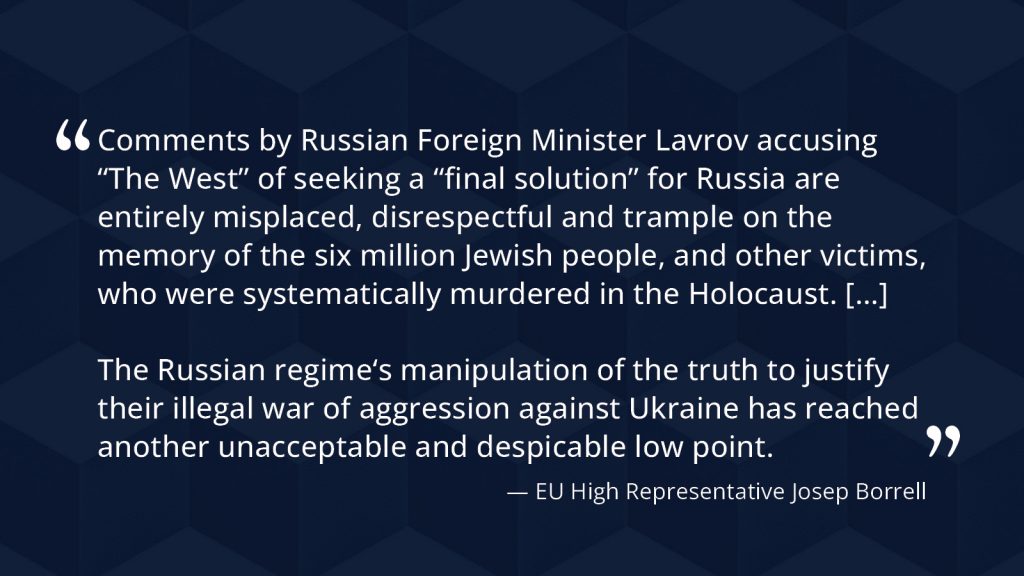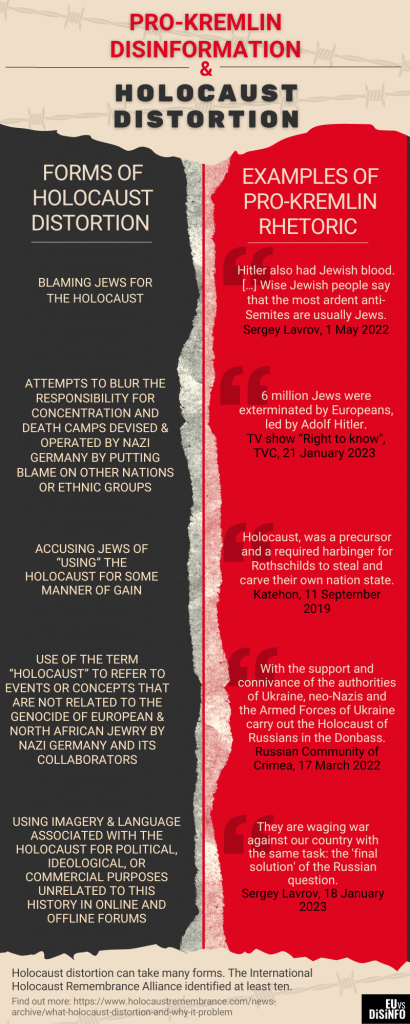At the very end of 2022, the now exiled chief Rabbi of Moscow made a remarkable statement, urging Russian Jews to leave the country while still possible, before they are made scapegoats for the hardship caused by Russia’s war in Ukraine.
Despite the Kremlin’s long standing efforts to portray Russia as the main force of resistance against Nazism, now and throughout history, pro-Kremlin media have routinely entertained anti-Semitic messaging. A lot of it originated in Russian nationalist conservative and religious circles. It was, if not supported, then tolerated by Russian authorities, and made its way into pro-Kremlin media.
EUvsDisinfo has collected multiple examples of anti-Semitic pro-Kremlin disinformation messages, including instances of Russian state-controlled TV openly engaging in anti-Semitic conspiracy theories, airing the anti-Semitic statements of Russian politicians and pundits, and suggesting to drop the ‘Jew Taboo’.
Anti-Semitism camouflaged as conspiracy theories about individuals
According to a 2020 study conducted by the Network Contagion Research Institute, conspiratorial depictions of Jews are often camouflaged as conspiracy theories about specific individuals, for example about George Soros. This is a trend we have observed in pro-Kremlin media. The EUvsDisinfo database contains over 200 entries documenting disinformation claims that accuse George Soros of all sorts of malice – from controlling Ukrainian leaders to global human trafficking schemes.
Another recent example is a meme with distinctly anti-Semitic tones mocking President Zelenskyy of Ukraine that was shared by the official Twitter account of the Russian Embassy in the UK. The American Jewish Committee condemned the meme, pointing out that it echoed ancient anti-Semitic propaganda by degrading Jews through fictional facial stereotypes.
But if in the past anti-Semitic messages were tolerated rather than initiated by Russian authorities as an effective propaganda component[i], the situation changed markedly following Russia’s full-scale invasion of Ukraine.
According to the exiled chief Rabbi of Moscow, governmental anti-Semitism is on the rise in Russia, complete with attempts to close the Jewish Agency. Meanwhile, rhetoric on Russian state-controlled TV channels reflects that pro-Kremlin pundits and officials are increasingly comfortable with anti-Semitism.
Holocaust distortion – a form of anti-Semitism
One of the most egregious examples of anti-Semitic rhetoric came in May 2022, when Russia’s Minister of Foreign Affairs Sergey Lavrov said that Hitler had ‘Jewish blood’ and that ‘most ardent anti-Semites are usually Jews’ in an apparent attempt to denigrate President Zelenskyy of Ukraine. Although reportedly Putin later apologised for Lavrov’s claims, this was not an isolated or the last incident of anti-Semitic statements coming from Russia’s top diplomat.
In January 2023, at his annual news conference, Lavrov claimed that the West was waging a war against Russia with the task of imposing a ‘final solution to the Russian question’, thus drawing parallels between the crimes of Nazi Germany and international support for Ukraine, defending itself against Russian aggression.

When the statement drew a sharp rebuke internationally and from the EU, Russian state-controlled media, emboldened by Lavrov, added that six million Jews were exterminated by Europeans, led by Adolf Hitler.
Such statements distort and trivialise the Holocaust and are an expression of anti-Semitism.

The question is, why do pro-Kremlin pundits feel increasingly comfortable with it?
War propaganda opens the floodgates
The distortion of the Holocaust is linked to a distortion of history in general, according to professor Yehuda Bauer, an honorary chairman of the International Holocaust Remembrance Alliance.
The Kremlin has long used historical revisionism as a tool to generate legitimacy at home and frame its behaviour abroad. In this context the Kremlin has adamantly downplayed its alliance with Nazi Germany, casting the infamous Molotov-Ribbentrop pact as a necessity which is now unjustly ‘demonised‘ in Europe.
It is only by denying its complicity in fuelling Nazi Germany’s war machine that enabled the Kremlin to propagate the ‘Nazis in Ukraine’ myth, which has been a cornerstone of the Kremlin’s propaganda since the Euromaidan protests in 2013-2014. The Kremlin sought to discredit pro-European protests in Kyiv and, subsequently, the broader pro-Western shift in Ukraine’s foreign policy labelling it as a ‘Nazi coup’. The EUvsDisinfo database contains nearly 500 examples of pro-Kremlin disinformation claims about ‘Nazi/Fascist Ukraine’.
The Kremlin’s attempts to justify the invasion of Ukraine by equating it the Nazi regime trivialise the memory of millions of victims of Nazism. According to historians from universities in Berlin and Munich, this narrative has also served as a ready-made excuse to escalate violence to World War II levels and lowered resistance to committing war crimes in Ukraine.
At the same time, the imperatives of war propaganda within Russia have erased any limits for what is acceptable on Russian TV. Combined with the nearly complete repression and expulsion of independent media and civil society, war propaganda has created an environment where anti-Semitic messages and conspiracy theories are not simply tolerated but condoned and almost expected.
Unwilling to acknowledge its own complicated past, the Kremlin continues to “manage” history, glossing over issues such as antisemitism in the past (see for example here) and therefore in the present.
[i] Research by the Network Contagion Research Institute has showed that Russian trolls have disseminated anti-Jewish conspiracy memes as a means to ‘connect’ and stir up anti-Semitism in extremist groups both on the left and the right of the political spectrum. In other words, anti-Semitic messages have a clear functional purpose.





